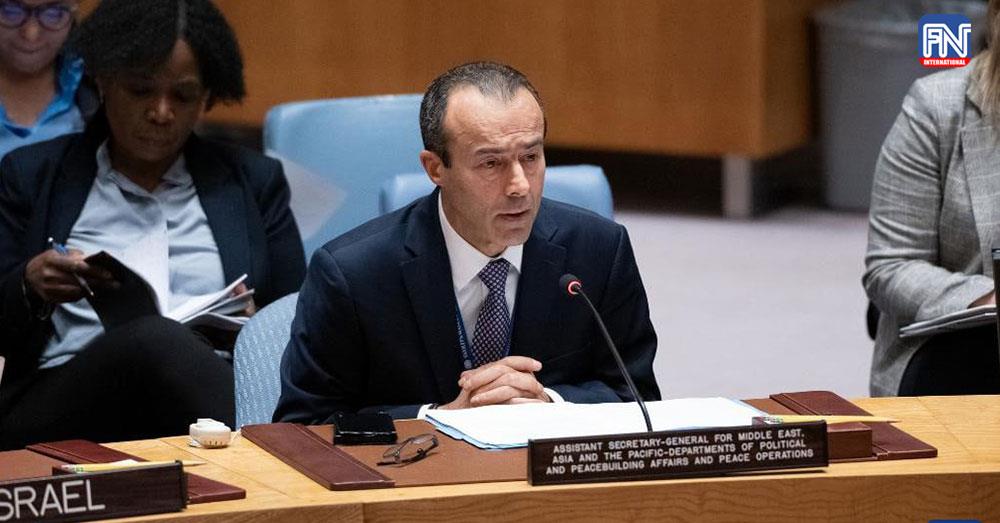UNITED NATIONS, Dec. 29 (Xinhua) -- A UN official on Friday warned of the consequences of the threat posed by Yemen's Houthi militia on maritime navigation in the Red Sea.
"The continued Houthi threat to maritime navigation in the Red Sea is of growing concern. It risks exacerbating regional tensions, and further escalation, and also has potentially grave political, economic, and humanitarian ramifications for millions in Yemen and the region," said Khaled Khiari, UN assistant secretary-general for the Middle East, Asia and the Pacific.
This threat also has potential ramifications at a global scale if regional and international shipping and supply chains are adversely impacted by further escalation in the Red Sea, he told the UN Security Council.
The United Nations continues to encourage de-escalation and a cessation of attacks and threats so that traffic through the Red Sea can return to its normal state and the risk of Yemen being dragged into a regional conflagration be avoided, said Khiari.
"The United Nations underscores the importance of ensuring that international law is respected in full in relation to maritime navigation. We appeal to all members of the international community to do everything in their power to use their influence on the relevant parties to prevent an escalation of the situation in the region," he said.
Briefing the Security Council on the situation in the Middle East, including the Palestinian question, Khiari said the situation in the region is alarming.
In Gaza, Israeli intense ground operations and fighting between Israeli forces and Hamas and others continued in most areas. Hamas and other Palestinian factions continue to fire rockets from Gaza into Israel. Civilians from both sides, particularly in Gaza, continue to bear the brunt of this conflict. The humanitarian situation in Gaza continues to deteriorate, he said, reiterating UN Secretary-General Antonio Guterres' call for an immediate humanitarian cease-fire.
The risk of regional spillover of this conflict with potentially devastating consequences for the entire region remains high given also a multitude of actors involved, he warned.
The continued daily exchanges of fire across the Blue Line between Lebanon and Israel pose a grave risk to regional stability. Increasingly, there have been strikes on civilian areas, with civilian casualties on both sides of the Blue Line, in addition to a rising number of fatalities among combatants. While most of these exchanges have been contained to areas within a few kilometers on either side of the Blue Line, there have been several instances of strikes deeper into the territories of Lebanon and Israel, raising the specter of an uncontained conflict, with potentially devastating consequences for the people of both countries, he said.
Attacks on U.S. bases in Iraq and Syria take place now on a daily basis with the United States conducting some airstrikes against groups suspected of these actions in Iraq and Syria. There are also reported Israeli airstrikes inside Syria, he said.
Across the occupied West Bank, heightened tensions between Israeli security forces and Palestinians, intensive violence and widespread movement restrictions have continued, said Khiari.
Recent weeks have seen some of the most intensive Israeli operations in the West Bank since the Second Intifada between 2000 and 2005. Many Palestinian casualties in the occupied West Bank occurred in the context of Israeli operations in Area A, which is under the full civil and security control by the Palestinian Authority, he said.
Since the Hamas attacks on Israel on Oct. 7, 304 Palestinians, including 79 children, have been killed in the occupied West Bank, including East Jerusalem. Since Oct. 7, four Israelis, including three members of the Israeli forces, have been killed in attacks by Palestinians in the West Bank, including East Jerusalem. Another four Israelis were killed during an attack by Palestinians in West Jerusalem, he said.
To prevent the recurrence of war and endless cycle of violence, the current hostilities throughout the occupied Palestinian territory must end with a plan to meaningfully advance the parties toward a negotiated solution, he said.
"We must restore a political horizon and move toward the only viable possibility for a peaceful future -- a two-state solution, with Gaza as an integral part of an independent Palestinian state, living side by side with Israel, in peace and security, based on the 1967 lines and with Jerusalem as the capital of both states," said Khiari.

Photo from Xinhua